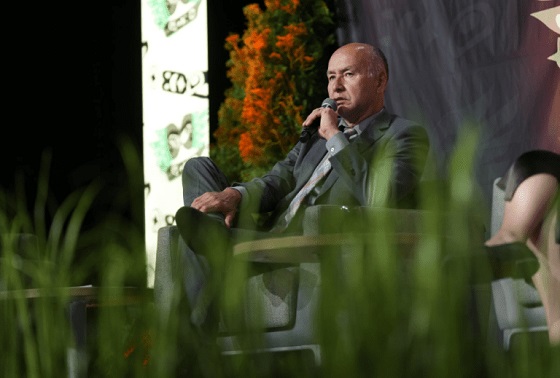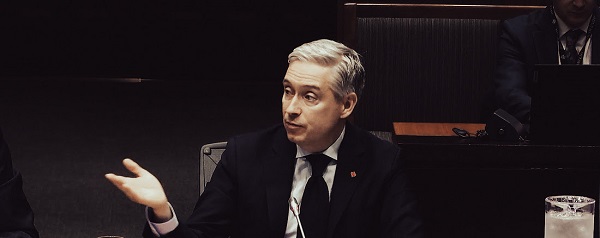Business
Carney dropped the ball on tariffs

This article supplied by Troy Media.
A 35 per cent U.S. tariff slams Canadian agri-food and puts farmers, jobs and grocery bills at risk
Canada has stumbled into its worst trade crisis in a generation.
On Aug. 1, while Mexico secured a reprieve, Ottawa failed to secure a deal before the tariff deadline, and now Canadian agri-food producers face a crushing 35 per cent U.S. tariff. For farmers and consumers alike, this isn’t a policy tweak. It’s a gut punch.
A tariff this steep is almost unheard of between close trading partners. It effectively prices many Canadian goods out of the U.S. market overnight.
Prime Minister Mark Carney—the seasoned economist who campaigned on his negotiating acumen and international gravitas—is failing. Instead of delivering results, Parliament was sent home for the summer, and Ottawa’s silence echoed through what is arguably Canada’s most consequential trade dispute in a generation.
To be clear, not all food exports are affected. Products covered under USMCA quotas—dairy, poultry and some meat—remain exempt. But for producers of grains, oilseeds, processed foods and niche value-added products, this 35 per cent tariff is a major blow.
Margins in agri-food are notoriously thin. For many exporters, the choice is binary: absorb the cost or exit the U.S. market. Either path reduces revenues, heightens the risk of layoffs and weakens Canada’s competitive position. With the U.S. absorbing over half of our agrifood exports annually, this is no minor hiccup: it’s a strategic failure. No other market comes close to absorbing that volume, meaning Canadian farmers have few real alternatives if the U.S. door slams shut.
This U.S. tariff is part of a troubling pattern. Canadian farmers are already facing stiff tariffs in other key markets. India continues to impose duties on Canadian lentils and pulses, while China maintains restrictions and tariffs on pork, canola and lobster. For a trading nation, these accumulating barriers are suffocating, yet Ottawa has focused more on damage control instead of prevention.
Forget the talk of silver linings. Tariffs may occasionally shift some production northward, as in the cocoa and chocolate supply chain, but these are rare exceptions. The real story is one of uncertainty, rising input costs and declining production volumes.
Consumers will feel it at the checkout. That means Canadians could soon be paying more for everyday staples—from bread and pasta to cooking oils and packaged goods—even if those products are made at home. But the damage doesn’t stop there; tariffs also wreak havoc upstream, disrupting input sourcing, contract logistics and production planning. Expect more volatility in prices, sporadic availability of staple ingredients and even empty shelves for certain products.
Compounding this are retaliatory tariffs and ripple effects through global supply chains. Many Canadian food manufacturers depend on imported inputs—machinery, additives, packaging—that are themselves caught in the crossfire. Inflationary pressures will persist, even if headline food inflation slows. These ripple effects are serious, but what makes them catastrophic is Ottawa’s failure to act. What’s most alarming isn’t the tariff itself, but the absence of a coordinated Canadian response.
Washington gave plenty of notice. And yet, no contingency plan emerged, no strategy was communicated and no evidence of serious negotiation surfaced.
Supporters of Bill C-202, which extends tariff protections for supply-managed sectors such as dairy and poultry, may take solace in the temporary shielding it provides. But that’s little comfort for the rest of the agri-food economy, and let’s not pretend supply management is immune to geopolitical pushback. It is, at best, a partial solution in an increasingly complex trade environment.
The bottom line: Canada once led in global trade diplomacy. Today, we are reactive, overly reliant on past frameworks and slow to acknowledge that trade has become a geopolitical chessboard, not a rules-based playground.
The agri-food sector—which accounts for nearly one in nine jobs and close to seven per cent of Canada’s GDP—deserves more than summer recesses and bureaucratic platitudes. It requires decisive leadership, policy agility and a proactive strategy to preserve market access and stabilize domestic food systems.
If Carney hopes to reset the narrative this fall, he’ll need to do far more than issue statements. Targeted tariff relief, short-term support for exposed sectors and a clear diplomatic pathway with Washington must be top priorities. Without this, more markets will close, more family farms will shutter and more grocery bills will climb.
Dr. Sylvain Charlebois is a Canadian professor and researcher in food distribution and policy. He is senior director of the Agri-Food Analytics Lab at Dalhousie University and co-host of The Food Professor Podcast. He is frequently cited in the media for his insights on food prices, agricultural trends, and the global food supply chain.
Troy Media empowers Canadian community news outlets by providing independent, insightful analysis and commentary. Our mission is to support local media in helping Canadians stay informed and engaged by delivering reliable content that strengthens community connections and deepens understanding across the country.
Business
The Grocery Greed Myth

Haultain’s Substack is a reader-supported publication.
To receive new posts and support our work, please consider becoming a free or paid subscriber.
Try it out.
The Justin Trudeau and Jagmeet Singh charges of “greedflation” collapses under scrutiny.
“It’s not okay that our biggest grocery stores are making record profits while Canadians are struggling to put food on the table.” —PM Justin Trudeau, September 13, 2023.
A couple of days after the above statement, the then-prime minister and his government continued a campaign to blame rising food prices on grocery retailers.
The line Justin Trudeau delivered in September 2023, triggered a week of political theatre. It also handed his innovation minister, François-Philippe Champagne, a ready-made role: defender of the common shopper against supposed corporate greed. The grocery price problem would be fixed by Thanksgiving that year. That was two years ago. Remember the promise?
But as Ian Madsen of the Frontier Centre for Public Policy has shown, the numbers tell a different story. Canada’s major grocers have not been posting “record profits.” They have been inching forward in a highly competitive, capital-intensive sector. Madsen’s analysis of industry profit margins shows this clearly.
Take Loblaw. Its EBITDA margin (earnings before interest, taxes, depreciation, and amortization) averaged 11.2 per cent over the three years ending 2024. That is up slightly from 10 per cent pre-COVID. Empire grew from 3.9 to 7.6 per cent. Metro went from 7.6 to 9.6. These are steady trends, not windfalls. As Madsen rightly points out, margins like these often reflect consolidation, automation, and long-term investment.
Meanwhile, inflation tells its own story. From March 2020 to March 2024, Canada’s money supply rose by 36 per cent. Consumer prices climbed about 20 per cent in the same window. That disparity suggests grocers helped absorb inflationary pressure rather than drive it. The Justin Trudeau and Jagmeet Singh charges of “greedflation” collapses under scrutiny.
Yet Ottawa pressed ahead with its chosen solution: the Grocery Code of Conduct. It was crafted in the wake of pandemic disruptions and billed as a tool for fairness. In practice, it is a voluntary framework with no enforcement and no teeth. The dispute resolution process will not function until 2026. Key terms remain undefined. Suppliers are told they can expect “reasonable substantiation” for sudden changes in demand. They are not told what that means. But food inflation remains.
This ambiguity helps no one. Large suppliers will continue to settle matters privately. Small ones, facing the threat of lost shelf space, may feel forced to absorb losses quietly. As Madsen observes, the Code is unlikely to change much for those it claims to protect.
What it does serve is a narrative. It lets the government appear responsive while avoiding accountability. It shifts attention away from the structural causes of price increases: central bank expansion, regulatory overload, and federal spending. Instead of owning the crisis, the state points to a scapegoat.
This method is not new. The Trudeau government, of which Carney’s is a continuation, has always shown a tendency to favour symbolism over substance. Its approach to identity politics follows the same pattern. Policies are announced with fanfare, dissent is painted as bigotry, and inconvenient facts are set aside.
The Grocery Code fits this model. It is not a policy grounded in need or economic logic. It is a ritual. It gives the illusion of action. It casts grocers as villains. It gives the impression to the uncaring public that the government is “providing solutions,” and that “it has their backs.” It flatters the state.
Madsen’s work cuts through that illusion. It reminds us that grocery margins are modest, inflation was monetary, and the public is being sold a story.
Canadians deserve better than fables, but they keep voting for the same folks. They don’t think to think that they deserve a government that governs within its limits; a government that accept its role in the crises it helped cause, and restores the conditions for genuine economic freedom. The Grocery Code is not a step in that direction. It was always a distraction, wrapped in a moral pose.
And like most moral poses in Ottawa, it leaves the facts behind.
Haultain’s Substack is a reader-supported publication.
To receive new posts and support our work, please consider becoming a free or paid subscriber.
Try it out.
Business
Tax filing announcement shows consultation was a sham

The Canadian Taxpayers Federation is criticizing Prime Minister Mark Carney for announcing that the government is expanding automatic tax filing within hours of the government’s consultation ending.
“There’s no way government bureaucrats pulled an all-nighter reading through thousands of submissions and survey responses before sending Carney out to make an announcement on automatic tax filing the next morning,” said Franco Terrazzano, CTF Federal Director. “Asking Canadians for their opinion and then ignoring them isn’t a good look for Carney, it makes it look like the government is holding sham consultations.”
The government of Canada announced consultations on automatic tax filing so Canadians could give the government “broad input through an online questionnaire.”
The government’s consultation ended on Thursday, Oct. 9, 2025.
Hours after the consultation ended, Carney today announced the government would expand automatic tax filing.
The CRA is already one of the largest arms of the federal government with 52,499 bureaucrats.
The CRA added 13,015 employees since 2016 – a 33 per cent increase. For comparison, America’s Internal Revenue Service has 90,516 bureaucrats. The CRA has one bureaucrat for every 800 Canadians. The IRS has one bureaucrat for every 3,800 Americans.
“The CRA can barely answer the phone, so Carney shouldn’t be giving those bureaucrats more busy work to do,” Terrazzano said. “The CRA is a bloated mess, and Carney should be cutting the cost of bureaucracy not scheming up ways to give the bureaucracy more power over taxpayers.”
The CRA only answered about 36 per cent of the 53.5 million calls it received between March 2016 and March 2017, according to a 2017 Auditor General report. When Canadians were able to get the CRA on the phone, call centre agents gave inaccurate information about 30 per cent of the time.
“The CRA acting as both tax collector and tax filer is a serious conflict of interest,” Terrazzano said. “Trusting the taxman to do your tax return is like trusting your dog to protect your burger.
“Carney should stop the CRA power grab and instead cut taxes and simplify the tax code.”
-

 Alberta1 day ago
Alberta1 day agoFact, fiction, and the pipeline that’s paying Canada’s rent
-

 Energy2 days ago
Energy2 days agoIn the halls of Parliament, Ellis Ross may be the most high-profile advocate of Indigenous-led development in Canada.
-

 Energy2 days ago
Energy2 days ago“It is intellectually dishonest not to acknowledge the … erosion of trust among global customers in Canada’s ability to deliver another oil pipeline.”
-

 Aristotle Foundation2 days ago
Aristotle Foundation2 days agoEfforts to halt Harry Potter event expose the absurdity of trans activism
-

 International18 hours ago
International18 hours agoTrump gets an honourable mention: Nobel winner dedicates peace prize to Trump
-

 Business10 hours ago
Business10 hours agoCarney government plans to muddy the fiscal waters in upcoming budget
-

 Bruce Dowbiggin2 days ago
Bruce Dowbiggin2 days agoCanada’s Humility Gene: Connor Skates But Truckers Get Buried
-

 International1 day ago
International1 day agoTrump-brokered Gaza peace agreement enters first phase








